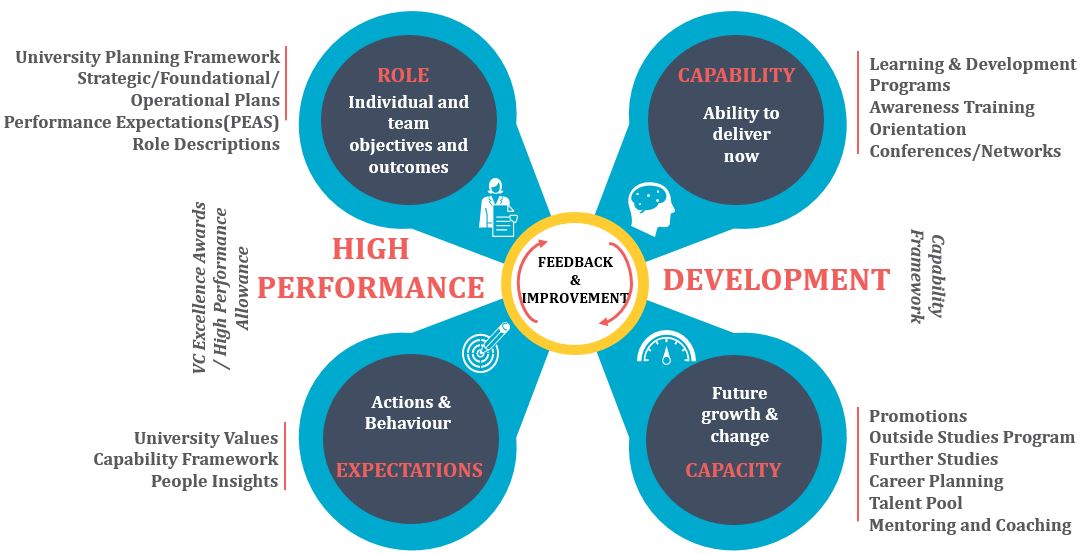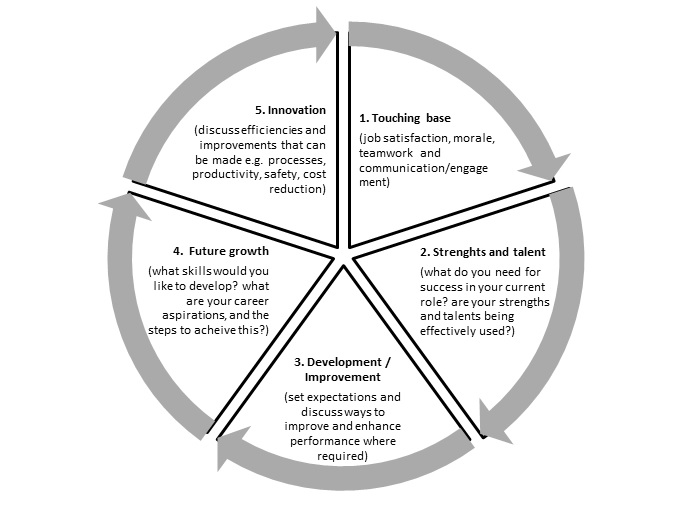Welcome to the University Policy Library.
If you are unable to find what you are looking for please use the 'search' function below.
Delegations of Authority Policy is the key document for who is responsible to exercise a delegation – Note: Policies and procedure documents may not reflect the current delegations. Please refer to the Delegations of Authority Policy to identify who the delegate is.
Performance Expectations Policy
Purpose:
This policy sets out the University of Canberra's approach to create a culture of continuous feedback for continuous improvement, through engaging with our people to understand their aspirations, and how we can assist employees to develop and reach their goals through high performance.
Scope:
This policy applies to all staff employed at the University.
While the principles in this Policy apply to Sessional and Casual employees, the activities undertaken will be on an as needs basis determined between the employee and their manager.
While the principles in this Policy apply to Sessional and Casual employees, the activities undertaken will be on an as needs basis determined between the employee and their manager.
Principles:
POLICY STATEMENT
The University strives to achieve excellence through our ambitious strategic agenda, with particular focus towards providing an enriched learning environment for our students. Development and recognition of our people is key to achieving this. The University enables individual employees and teams to be self-driven in achieving high performance, and in the identification of development and career goals, in the following areas of focus:
As part of the University's overarching Planning Framework, Managers undertake forward planning for the academic/calendar year with their teams and staff to set clear work objectives, goals and expectations, during the period from November through to February. Ongoing feedback, development and career conversations will naturally flow from this strategic planning process and should be conducted in accordance with the principles set out within this Policy.
Performance Framework

PRINCIPLES
This policy is based on the following foundational principles:
The University's focus is on continuous improvement, and building successful careers with and for our people. We do this by engaging in regular dialogue with staff and teams over the course of the year. Importantly, the University recognises and values the diversity of aspirations and capability of our people, and that careers can progress in many different ways. Achieving sustained excellence in one role over a period of time, aspiring to a position of management or leadership, or broadening by taking a ‘sideways’ step are some of the potential career considerations. Feedback and development conversations are informal, designed to be ongoing, two-way, and to address all aspirations of a staff member, not just their daily work. They should maintain a focus on maximising performance, and a willingness to both give and receive feedback and ideas. Each discussion stage of the feedback and development conversation cycle may be conducted at a frequency and duration that suits the employee and their manager. The framework is intended as a guide, offering flexibility across focus areas for discussion at either an individual level, or to support team-based conversations.
Feedback and development conversations are informal, designed to be ongoing, two-way, and to address all aspirations of a staff member, not just their daily work. They should maintain a focus on maximising performance, and a willingness to both give and receive feedback and ideas. Each discussion stage of the feedback and development conversation cycle may be conducted at a frequency and duration that suits the employee and their manager. The framework is intended as a guide, offering flexibility across focus areas for discussion at either an individual level, or to support team-based conversations.
In circumstances where conversations result in the reinforcing of standards for a staff member as to expectations of their performance, including where managers identify underperformance, this will be addressed on a case by case basis in accordance with the relevant University of Canberra Enterprise Agreement as in force at the time.
STUDIES ASSISTANCE
The University aims to support staff with their future growth, through identifying the steps needed to achieve career goals. Recognition for an individual’s capacity and career development is available through promotion, Outside Studies Program (Academic staff), mentoring, coaching, mobility across other roles, and undertaking further study. The University provides support for staff to undertake learning and education through further study, which may take the form of paid or unpaid study or examination leave, and/or financial assistance to meet study costs.
Applications for Studies Assistance will be considered and approved at the manager’s discretion, according to the following principles:
The University maintains commitment and belief in the quality of teaching, learning, research and the student experience provided. As such, in accordance with this Policy, if the course of study proposed is one provided by the University of Canberra, then a decision taken by an individual to undertake the study at a different institution will not attract Study Assistance.
The University strives to achieve excellence through our ambitious strategic agenda, with particular focus towards providing an enriched learning environment for our students. Development and recognition of our people is key to achieving this. The University enables individual employees and teams to be self-driven in achieving high performance, and in the identification of development and career goals, in the following areas of focus:
- Role: individuals and teams having a clear understanding of their role, their work objectives, and the University outcomes that they contribute to;
- Expectations: broadening the scope of performance beyond the technical requirements of the job, this places emphasis on living the University's values through behaviours and attitudes, supporting transformative change through entrepreneurial behaviours, team work, respect, inclusion and a focus on continuous improvement;
- Capability: ensuring our people have the knowledge and skills to deliver and achieve success in their current role; and
- Capacity: the potential that individuals and teams possess for growth and adaptation into the future, including planning for future career steps and nurturing and developing key talent.
As part of the University's overarching Planning Framework, Managers undertake forward planning for the academic/calendar year with their teams and staff to set clear work objectives, goals and expectations, during the period from November through to February. Ongoing feedback, development and career conversations will naturally flow from this strategic planning process and should be conducted in accordance with the principles set out within this Policy.
Performance Framework
PRINCIPLES
This policy is based on the following foundational principles:
- Every staff member is selected on the basis of the skills, knowledge and experience that they bring to their role, supporting their ability and an underlying assumption that they meet all standards and expectations of their role.
- All staff are encouraged and supported to not only be active participants, but to take ownership and be self-driven in their performance, achievement and development.
- A cascade of strategy will exist for teams and individuals contributing to overall University outcomes, through alignment of objectives as part of the University’s overall planning framework.
- Leaders and managers are responsible for engaging with their people, and their own leadership capability development to achieve and promote the performance framework as outlined above.
The University's focus is on continuous improvement, and building successful careers with and for our people. We do this by engaging in regular dialogue with staff and teams over the course of the year. Importantly, the University recognises and values the diversity of aspirations and capability of our people, and that careers can progress in many different ways. Achieving sustained excellence in one role over a period of time, aspiring to a position of management or leadership, or broadening by taking a ‘sideways’ step are some of the potential career considerations.
In circumstances where conversations result in the reinforcing of standards for a staff member as to expectations of their performance, including where managers identify underperformance, this will be addressed on a case by case basis in accordance with the relevant University of Canberra Enterprise Agreement as in force at the time.
STUDIES ASSISTANCE
The University aims to support staff with their future growth, through identifying the steps needed to achieve career goals. Recognition for an individual’s capacity and career development is available through promotion, Outside Studies Program (Academic staff), mentoring, coaching, mobility across other roles, and undertaking further study. The University provides support for staff to undertake learning and education through further study, which may take the form of paid or unpaid study or examination leave, and/or financial assistance to meet study costs.
Applications for Studies Assistance will be considered and approved at the manager’s discretion, according to the following principles:
- Alignment and relevance of the proposed course of study with the individual’s development plans;
- Alignment with University outcomes and strategic vision, benefiting the goals of the work area;
- An assessment of the impact of the type of assistance sought, including that it can be accommodated within the work area budget, operational needs and functioning of the area; and
- Consideration for any fringe benefit tax implications, including liability that may be incurred by the work area, and meeting budget outcomes.
The University maintains commitment and belief in the quality of teaching, learning, research and the student experience provided. As such, in accordance with this Policy, if the course of study proposed is one provided by the University of Canberra, then a decision taken by an individual to undertake the study at a different institution will not attract Study Assistance.
Responsibilities:
Managers and Supervisors:
- Engage with staff on a regular basis to ensure they understand their individual and team role, what is expected of them, how they are going, and what they are working towards in the future.
- Identify situations where performance does not meet standards or expectations, and take follow up steps as appropriate to the circumstances.
- Identify and recognise high performance at both individual and team level.
- Be open to feedback and ideas, adopt a collaborative approach to improvement and maximising performance.
- Participate constructively in discussions and offer commitment to work at implementing proposed solutions and improvements.
- Think creatively about your goals and what you wish to achieve in your role, and into the future.
- Be self-driven by taking the initiative to seek feedback, or arrange a conversation with your manager where needed.
- Be open to feedback and ideas, adopt a collaborative approach to improvement and maximising performance.
Supporting Information:
Questions about the application of this policy, including guidance on feedback and career conversations, can be directed to ucpeople@canberra.edu.au or if you are a Manager, your People and Diversity Business Partner.


